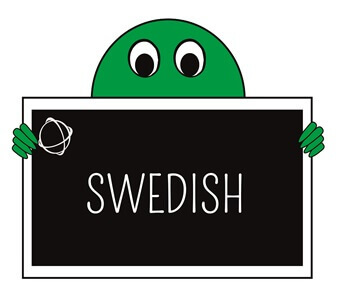Translation into Swedish
Swedish
It is interesting that so many Swedish exports have found significant success in the UK. Abba, Bjorn Borg, IKEA, Pippi Longstocking, Steig Larsson and Zlatan, along with many others have become household names in Britain. It can’t be a coincidence that so many attract such fame in English speaking nations and I wonder if at least part of that is due to linguistic similarities between English and Swedish.

Okay, etymology and general clever stuff follows. Feel free to skip to the next bit entitled Fun Bit, but bear in mind, you won’t go to sleep tonight as knowledgeable as you would if you read it… Still here? Good. To use the words of Jennifer Aniston “here come the science bit… concentrate…”.
It is generally accepted that English and Swedish are both Germanic languages from different branches (English in the Western branch and Swedish in the Northern or Scandinavian). However, there are some researchers who would dispute this and go as far to claim that English is actually a Scandinavian language. They claim that Modern English, instead of evolving from Anglo Saxon or Old English, actually derives from a Scandinavian language, which is down to the influence of the Vikings who settled in the North of England. They point to the greater similarities that Modern English shares with the language spoken by the Scandinavian Danelaw (the part of England dominated by Vikings in the early 11th century) settlers, than with Old English.
This is partly evidenced by the fact that Swedish and English share many words. This is a common occurrence when two languages come into such close contact, but there are grammatical similarities which present a strong argument for English being a Scandinavian language. For example, in Modern English and Swedish, the object in a sentence is placed after the verb, whereas in Old English and German, the verb can often appear at the end of a sentence. Furthermore in English and Scandinavian languages you can have a split infinitive, use a group genitive and place a preposition at the end of the sentence – none of which is possible in other Western Germanic languages.
Fun Bit
We actually share 1,558 words, although admittedly some of these are false friends. These are words which are spelt the same, but carry different meanings. This can cause a social faux pas or two. For example, ‘bra’ in Swedish actually means ‘good’ and ‘kissa’ means ‘to pee’ – you can see why it could cause embarrassment. Words such as ‘ketchup’, ‘plankton’, ‘levitation’, ‘nudist’, ‘opera’, ‘second-hand’ (yes, that one got me!) and ‘trombonist’ are the same in both languages. Oh, and most swearwords too – the main ones, anyway. Whilst watching The Bridge (c’mon, I can’t talk about Swedish and not mention The Bridge?!) I particularly love how Saga (protagonist) would be talking away in Swedish and all of a sudden and appearing out of nowhere, I hear a word in English. Or rather a Swedish word we English use. This kind of thing always takes me by surprise. Bill Bailey does a great sketch about this. When you have finished reading TO THE END, might I suggest you check this out? It’s the Bill Bailey “Part Troll” DVD. So, if you were talking to a trombone player who performed in a nudist-opera using a second-hand instrument, and who liked to eat plankton with ketchup, you’d be fine. Just don’t go off-topic, but split your infinitives to your heart’s desire.
Cool Swedish version of our word ‘eavesdrop’ is ‘tjuvlyssna’. The literal translation is thief listen.
And I think this one is my favourite ‘solkatt’ – it’s the glimmer that reflects the sunshine or bright light off a wrist-watch. Back-in-the-day we (everyone I was at school with who wore a watch) used to try and get this light in the teachers’ eyes. I wish I knew it had a name. Sorry Mr Grall, if you’re reading this. It wasn’t my idea. He (points to mate) made me do it.
Least favourite word? ‘Fartlek’. If you have ever trained for a marathon, you will know what this is. For those of you who haven’t (me!), it’s running very (very) fast and then jogging for a bit and then fast etc. This is usually between trees or lamp-posts and can be very disconcerting to a lone walker. We call it interval training. Whatever name you want to give it, it is still an exhausting thing to do.
You can read more here, but be warned, you may not get anything done today. Happy reading!
Right I am off to see a nudist opera about someone who can levitate. I know one of the trombonists, Olof.. he’s mad for plankton and ketchup.
If you need a translation into or from Swedish, get in touch today or call on 01727 812 725.














